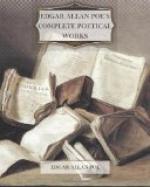feeling that, half appreciating, half responded to
your earnest love and sorrow; but this feeling took
no root in the pulseless heart, and seemed indeed
rather a shadow than a reality, and faded quickly
away, first into extreme quiescence, and then into
a purely sensual pleasure as before.
And now, from the wreck and the chaos of the usual senses, there appeared to have arisen within me a sixth, all perfect. In its exercise I found a wild delight—yet a delight still physical, inasmuch as the understanding had in it no part. Motion in the animal frame had fully ceased. No muscle quivered; no nerve thrilled; no artery throbbed. But there seemed to have sprung up in the brain that of which no words could convey to the merely human intelligence even an indistinct conception. Let me term it a mental pendulous pulsation. It was the moral embodiment of man’s abstract idea of Time. By the absolute equalization of this movement—or of such as this—had the cycles of the firmamental orbs themselves been adjusted. By its aid I measured the irregularities of the clock upon the mantel, and of the watches of the attendants. Their tickings came sonorously to my ears. The slightest deviations from the true proportion—and these deviations were omniprevalent—affected me just as violations of abstract truth were wont on earth to affect the moral sense. Although no two of the timepieces in the chamber struck the individual seconds accurately together, yet I had no difficulty in holding steadily in mind the tones, and the respective momentary errors of each. And this—this keen, perfect self-existing sentiment of duration—this sentiment existing (as man could not possibly have conceived it to exist) independently of any succession of events—this idea—this sixth sense, upspringing from the ashes of the rest, was the first obvious and certain step of the intemporal soul upon the threshold of the temporal eternity.
It was midnight; and you still sat by my side. All others had departed from the chamber of Death. They had deposited me in the coffin. The lamps burned flickeringly; for this I knew by the tremulousness of the monotonous strains. But suddenly these strains diminished in distinctness and in volume. Finally they ceased. The perfume in my nostrils died away. Forms affected my vision no longer. The oppression of the Darkness uplifted itself from my bosom. A dull shot like that of electricity pervaded my frame, and was followed by total loss of the idea of contact. All of what man has termed sense was merged in the sole consciousness of entity, and in the one abiding sentiment of duration. The mortal body had been at length stricken with the hand of the deadly Decay.
Yet had not all of sentience departed; for the consciousness and the sentiment remaining supplied some of its functions by a lethargic intuition. I appreciated the direful change now in operation upon




